Learn how AI agents are transforming data analysis by automating tasks, improving decision-making, and delivering real-time insights for businesses.

Ka Ling Wu
Co-Founder & CEO, Upsolve AI
Nov 14, 2025
10 min
AI agents in analytics are designed to automate parts of the data analysis workflow as part of the broader shift toward AI-powered business intelligence, but that doesn't mean they're flawless.
They can speed up tasks like profiling, testing, and reporting, yet they also introduce risks like bias, missed context, or over-reliance on patterns that don’t hold up.
Unlike traditional tools that stick to fixed queries and outputs, agents generate results dynamically.
That flexibility is powerful, but it also means the same dataset can produce different outcomes depending on how the agent is used.
Key Takeaways
|
How AI Agents Work in Data Analysis
AI agents aren’t just reporting assistants, they embed into SaaS data pipelines to monitor usage, queries, and anomalies in real time.
Unlike BI dashboards that wait for user prompts, AI agents proactively flag governance risks, performance drifts, and compliance gaps.
They start by helping product teams auto-generate reports and explain results to end users.
Over time, they evolve into embedded analysts that keep SaaS platforms transparent, reliable, and audit-ready.
This makes them critical for scaling SaaS with trustworthy AI insights.
In daily business, you’ll see them in action:
Helping marketing teams find hidden trends in customer data.
Monitoring sales numbers and flagging issues before they grow.
Detecting fraud early by spotting unusual patterns.
Automating reports so teams focus on decisions, not data prep.
AI agents make data analysis faster, smarter, and less hands-on, letting teams move from managing data to acting on insights.
Here’s How Arthur Cut Costs by 70% and Scaled AI Governance 3x Faster with Upsolve:
Arthur embeds BI for model & LLM observability and monitoring at Fortune 100 companies | Upsolve AI
How Deep AI Agents Can Go in Data Analysis?
AI agents don’t just handle surface-level tasks like pulling reports or providing a summary.
They dive deep into data to uncover patterns, test assumptions, and even predict future trends.
They can:
Analyze millions of records in seconds to spot hidden correlations.
Detect anomalies that aren’t obvious to humans.
Generate new hypotheses based on evolving data streams.
Validate findings by cross-referencing multiple datasets automatically.
Some advanced agents go a step further, learning from past analyses and adjusting their approach as business conditions change.
The deeper they go, the more they turn raw data into actionable insights without constant supervision.
With AI agents, data analysis isn’t just faster, it’s smarter, more thorough, and constantly evolving.
Types of AI Agents Used in Data Analytics
AI agents in data analytics come in different forms, each designed to automate specific tasks and enhance decision-making. For a deep dive into the best options available, see our guide to AI agents for data analysis.
Query Agents
Automate SQL or natural language queries, turning user requests into instant, accurate data insights without manual scripting.
Monitoring Agents
Continuously track pipeline health, usage trends, and anomalies to ensure SaaS products stay reliable at scale.
Governance Agents
Enforce compliance rules, track audit logs, and flag risky data handling to maintain trust in regulated industries.
Optimization Agents
Analyze workloads and resource use, suggesting performance tweaks that cut costs and improve efficiency.
Recommendation Agents
Learn from user behavior to deliver contextual insights, guiding both product teams and end-users with actionable next steps.
The Benefits of Using AI Agents for Data Analysis
AI agents transform the way teams handle data by making analysis faster, smarter, and more reliable.
1. Speed up your workflows
What once took days can now be done in minutes. AI agents accelerate analysis so teams can focus on decisions instead of waiting for reports.
2. Eliminate repetitive work
AI takes over routine work like data cleaning and formatting, reducing manual effort while improving accuracy.
3. Reduce human errors and bias
By standardizing processes, AI ensures consistent and reliable outcomes, helping teams avoid mistakes that creep in with manual analysis.
4. Ask questions in plain English
No SQL or coding required, just type your question, and AI agents instantly return answers with charts and visual reports.
5. Keep a pulse on your data in real time
AI doesn’t stop after one analysis. It continuously monitors streams of data, flagging changes and offering adaptive analytics as conditions evolve.
Where AI Agents Fit in the Data Analysis Lifecycle
Phase | AI Agent Role |
Exploration | Intelligent profiling and anomaly detection to quickly spot patterns or outliers |
Hypothesis Generation | Uncover hidden correlations and trends to form smarter data-driven questions |
Execution | Automated coding, statistical testing, and visualizations |
Validation | Cross-check results to ensure accuracy and significance |
Insight Generation | Generate tailored recommendations for stakeholders |
Delivery | Automated, dynamic reporting to share updated insights efficiently |
How AI Agents Are Changing the Role of Data Analysts?
AI agents are transforming how analysts work, shifting focus from routine tasks to strategic, insight-driven decision-making.
AI Agents are Taking Over Routine Data Tasks
AI agents handle repetitive work like cleaning, validating, and reporting, letting analysts focus on decisions that drive the business forward.
Analysts Spend Less Time Fixing and More Time Interpreting Instead of spending hours debugging SQL or monitoring data pipelines, analysts can now focus on interpreting the insights AI produces.
This shift allows them to tie findings directly to business outcomes and guide teams toward more informed decisions.
Human Review Will Keep AI Outputs Reliable
While AI speeds up workflows, its results still need human oversight. Analysts validate the accuracy, fairness, and reliability of AI-generated outputs, making sure the insights can be trusted by leadership and used confidently in decision-making.
Their Role is Moving Closer to Strategy
With dashboards and alerts automated, analysts work more closely with product, marketing, and operations, shaping the bigger picture instead of just delivering reports.
What the Industry Data Shows
The shift is already visible. IBM paused hiring for 8,000 roles in 2023 due to AI automation, but quickly began hiring for new roles in AI governance and workflows.
The World Economic Forum projects 92 million jobs displaced by 2030—but also 170 million new ones created in AI, data, and digital transformation.
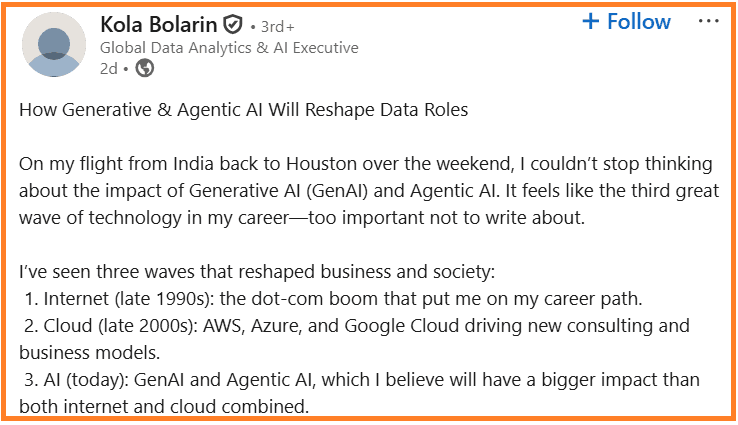
As Kola Bolarin, Sr. Director of Global Data Analytics at KPMG, reflected after a long flight from India to Houston:
“I believe GenAI and Agentic AI will have an impact even greater than the internet and cloud eras. This isn’t a passing phase, it will become embedded in how we live and work. Agentic AI, in particular, completes the vision of AI by enabling autonomous, collaborative systems that can transform business operations and personal lives alike.”
Challenges and Considerations in Adopting AI Agents
Adopting AI agents isn’t without hurdles, teams must navigate challenges around cost, complexity, compliance, and trust before unlocking their full potential.
Challenges in Adopting AI Agents for Data Analysis
Data quality and governance are critical, poor or inconsistent data can lead to misleading insights.
Interpretability and trust matter, teams need AI outputs to be understandable and reliable.
Bias and fairness remain issues, as AI can unintentionally reinforce existing patterns.
Ethical concerns arise when AI decisions don’t align with organizational or societal values.
Integration complexity can slow adoption, especially when connecting AI to multiple systems and datasets. Choosing the right AI BI tools with strong integrations helps reduce this friction.
Scalability is a challenge, ensuring AI performs well as data volume and complexity grow.
Considerations in Adopting AI Agents for Data Analysis
Cost management is key, covering software, infrastructure, and ongoing training.
Human oversight remains essential to maintain accuracy and alignment.
Change management is necessary for teams to adapt workflows and mindsets to AI.
Skills matter, analysts need new abilities to work effectively alongside AI agents.
Performance monitoring ensures AI continues to deliver accurate, actionable insights.
Security and compliance are vital when handling sensitive or regulated data.
The Future of AI Agent–Powered Data Analysis
Multi-agent collaboration will allow AI systems to work together, tackling complex business problems that no single agent could solve alone.
Domain-specific AI agents trained for particular industries, like finance, healthcare, or logistics, will deliver deeper, more relevant insights.
Predictive insights will anticipate business needs, helping teams act before problems arise or opportunities slip away.
Human–AI partnerships will redefine decision-making, with analysts and strategists using AI-generated insights to drive proactive, smarter strategies.
Use Upsolve to Create AI Agent for Your Data Analytics
Upsolve’s Data-Aware AI Agent Builder lets teams create intelligent, data-aware agents that can query SQL databases, analyze results, and provide insights directly inside dashboards or embedded SaaS tools.
Here’s the process flow.
1. Connect Your Data
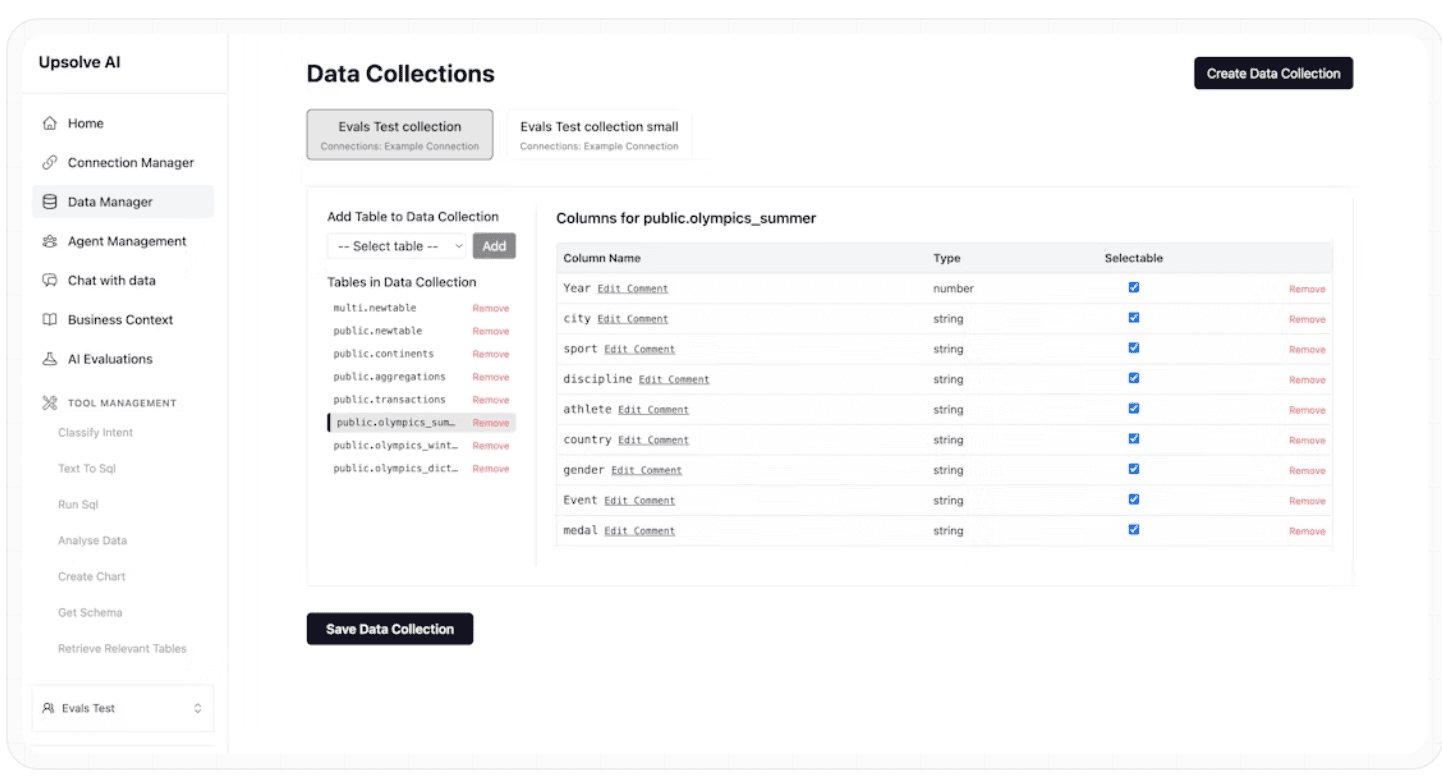
Start by connecting your SQL database (Postgres, BigQuery, Snowflake, etc.) or APIs.
This gives your agent direct access to structured data.
2. Define Business Context
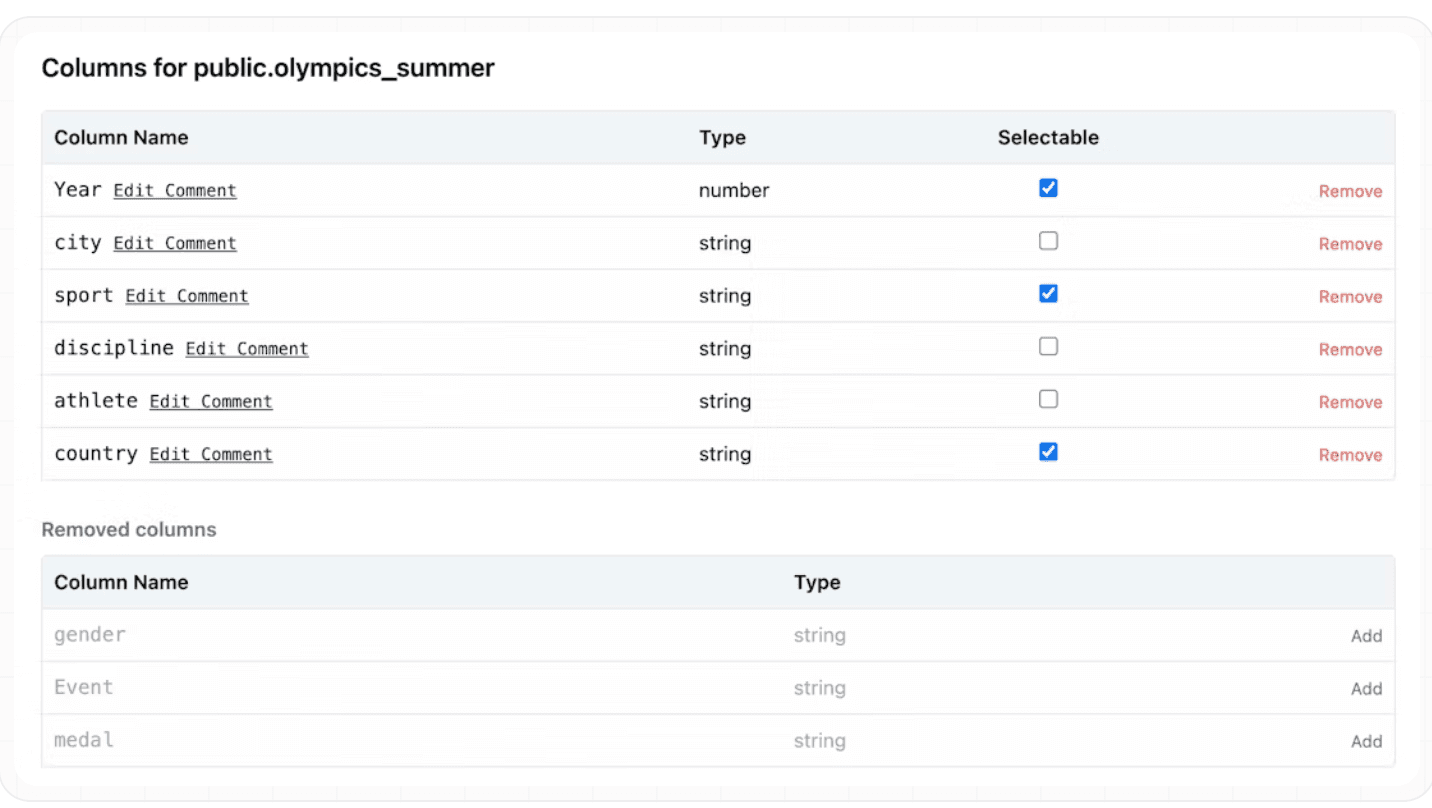
Mark important columns like product_name or region so the agent understands human-friendly terms and aligns queries with business context.
3. Ask Questions in Natural Language
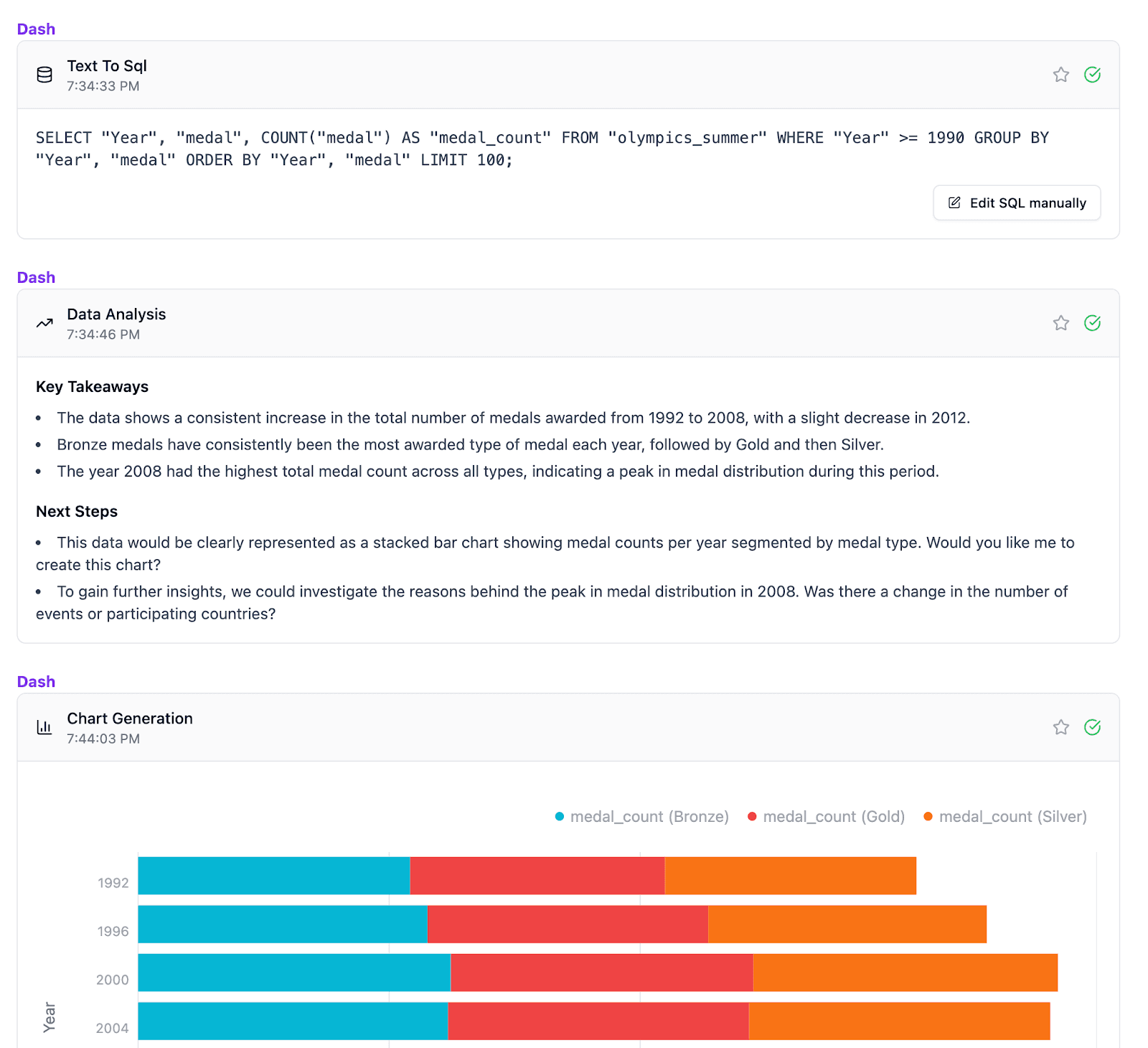
Use plain English queries (e.g., “What are the top products sold last quarter?”). The agent auto-generates SQL, runs it, and shows results with context.
4. Save as Golden Assets
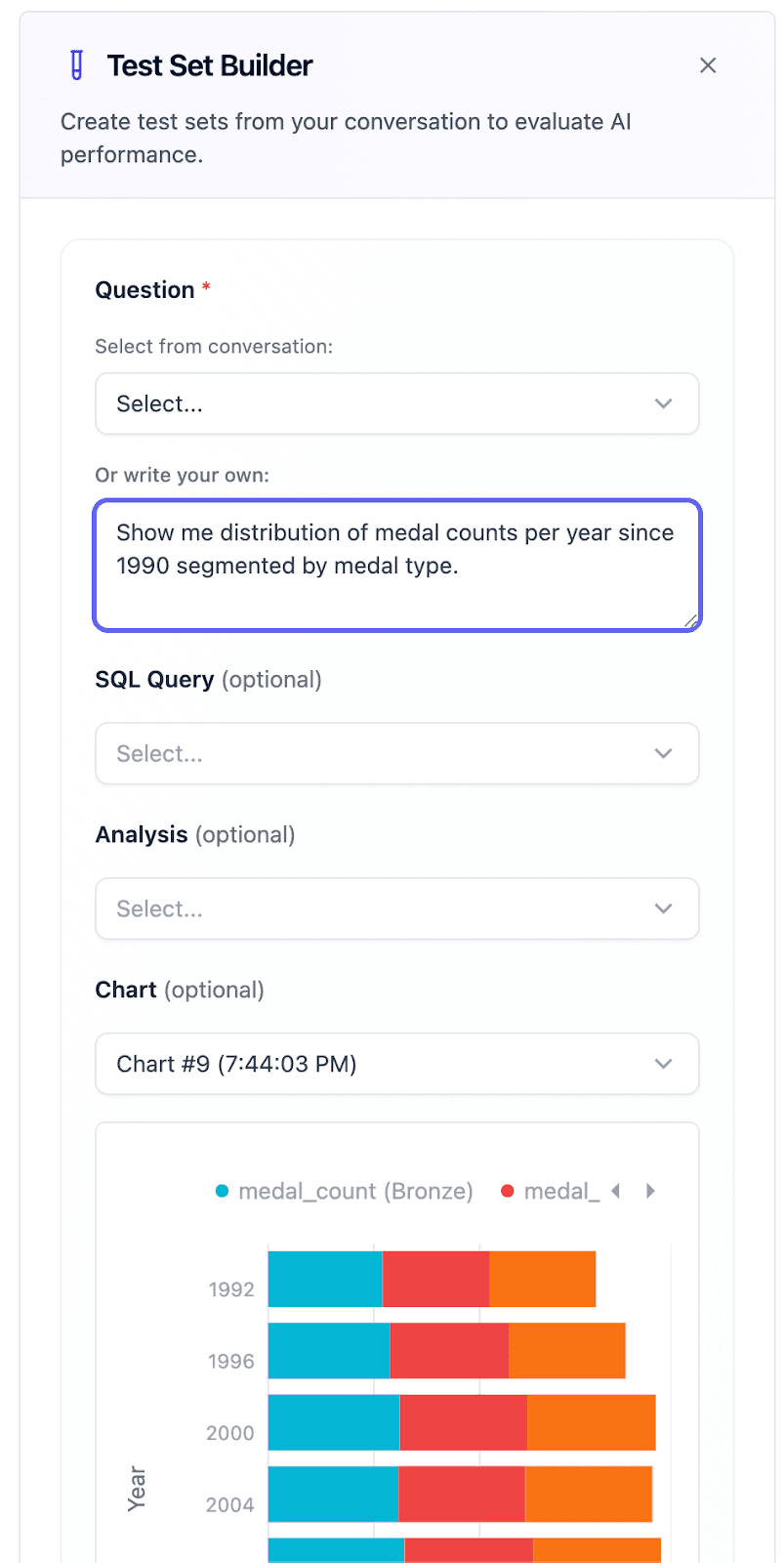
Successful question-answer pairs can be saved as Golden Assets.
This improves consistency and helps the agent learn reusable insights.
5. Test and Deploy
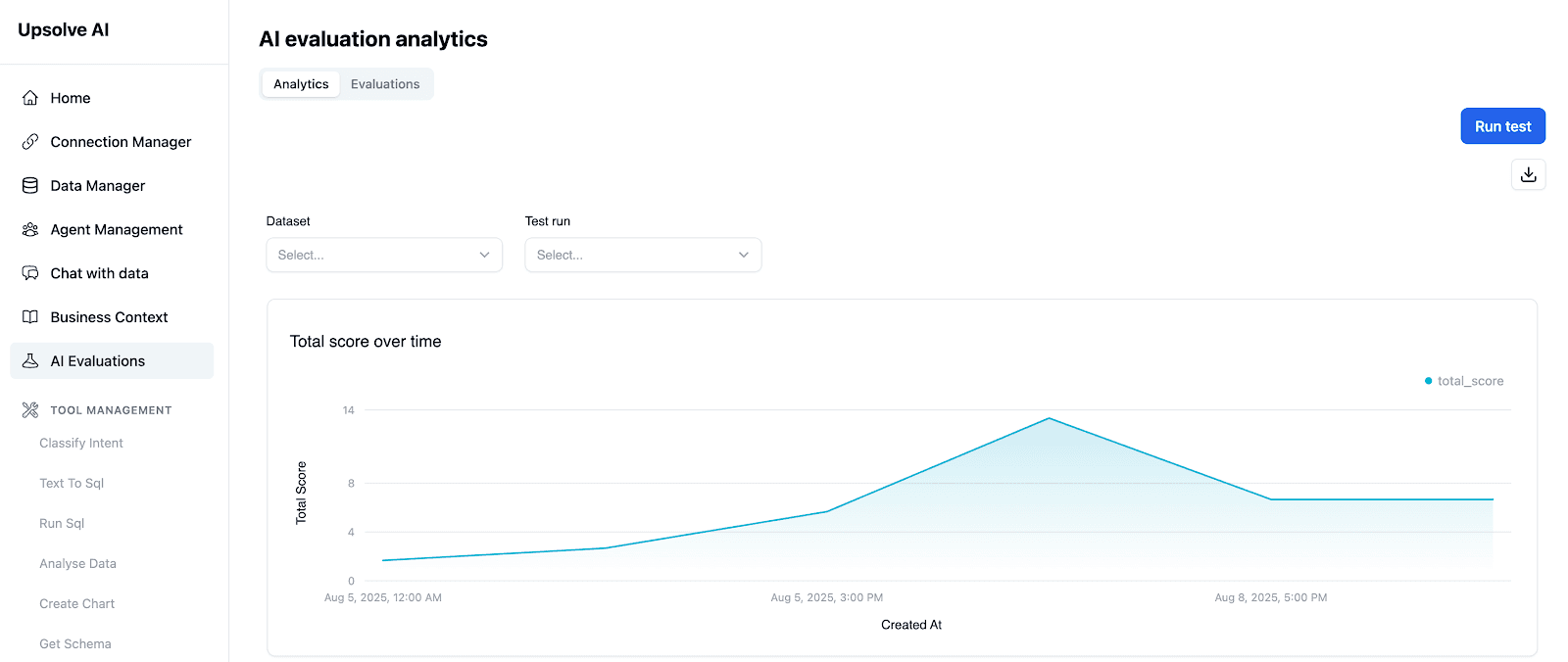
Before release, test with evaluation datasets to check accuracy. Then deploy the agent inside dashboards, apps, or via API.
Conclusion: Why Now Is the Time to Embrace AI Agents
AI agents are redefining how data analysis happens in 2025, moving beyond manual prep and reporting into intelligent, automated workflows.
Instead of just running queries, data-aware agents adapt to the context of your pipelines, learn from evolving datasets, and deliver insights that stay relevant as business conditions change.
Upsolve strengthens this shift by acting as a data-aware AI agent builder, giving teams the tools to:
Seamlessly integrate diverse data sources, ensuring agents have full context from day one.
Continuously monitor agent performance, so insights remain accurate and trustworthy.
Enable context-driven alerts that adapt to real business scenarios, not just static rules.
Auto-document analytical reasoning for transparency and compliance.
Support collaboration between analysts, engineers, and business users in one unified workflow.
With Upsolve, build data-aware, context-intelligent agents that scale reliably, improve over time, and deliver insights that drive faster, smarter decisions.
Explore Upsolve, schedule a live demo.
FAQs
How does Upsolve support data analysis in 2025?
Upsolve integrates multiple data sources, tracks AI agent performance, and provides real-time insights, making analysis faster, more accurate, and collaborative.
Will AI agents replace human data analysts?
No, AI agents handle repetitive tasks and surface insights, while analysts focus on interpretation, strategy, and decision-making.
How secure is sensitive data with AI agents?
Upsolve ensures strong encryption, access controls, and compliance measures, keeping sensitive data safe throughout AI analysis.
What industries can benefit the most from AI-driven analysis?
Finance, healthcare, marketing, retail, logistics, and SaaS companies see the most impact, but nearly any data-driven business can benefit.
Do small businesses also benefit from adopting AI agents?
Yes, AI agents help small teams scale analysis, gain insights faster, and make strategic decisions without hiring large analytics teams.
How do AI agents improve data exploration specifically?
They automate profiling, detect anomalies, surface hidden patterns, and allow natural language queries, making exploration faster and smarter.
What challenges should organizations prepare for?
Organizations should address data quality, AI bias, governance, human oversight, and cost management when adopting AI agents.
How quickly can ROI be seen after implementing AI agents?
ROI is often visible within weeks to a few months, depending on data complexity, workflows, and how quickly teams adopt the platform.
What skills do analysts need to work effectively with AI agents?
Analysts should have domain knowledge, data interpretation skills, and the ability to guide AI workflows, plus familiarity with natural language querying.

Try Upsolve for Embedded Dashboards & AI Insights
Embed dashboards and AI insights directly into your product, with no heavy engineering required.
Fast setup
Built for SaaS products
30‑day free trial










